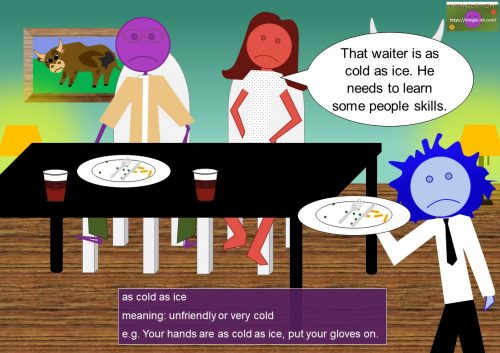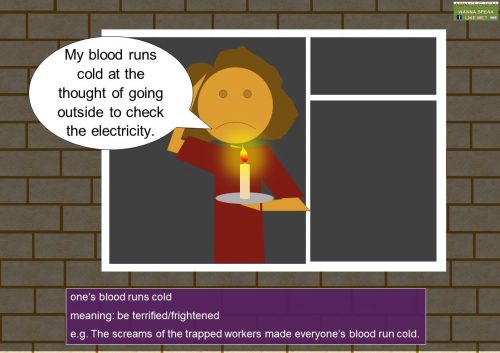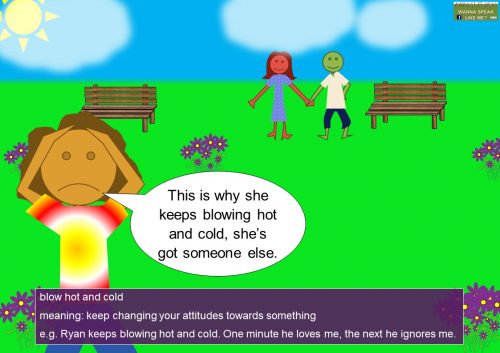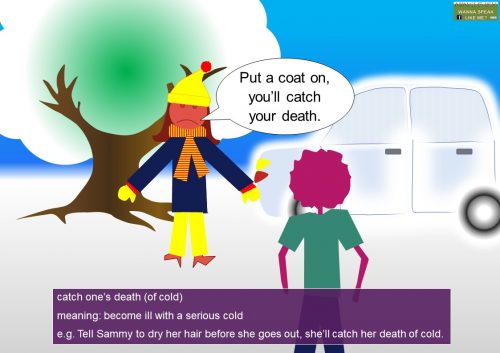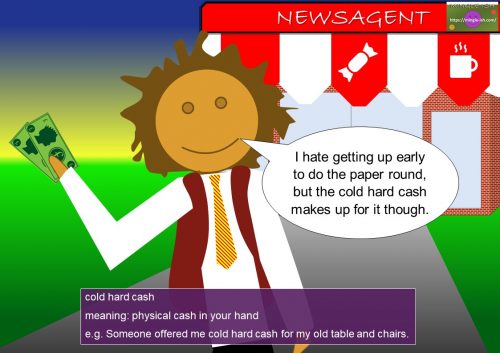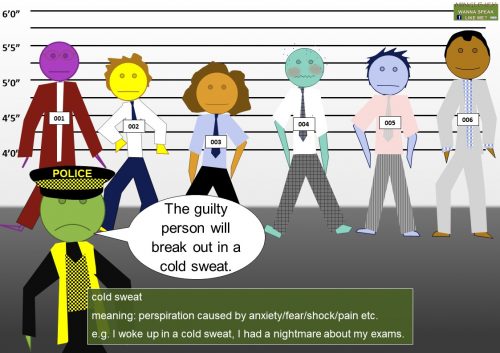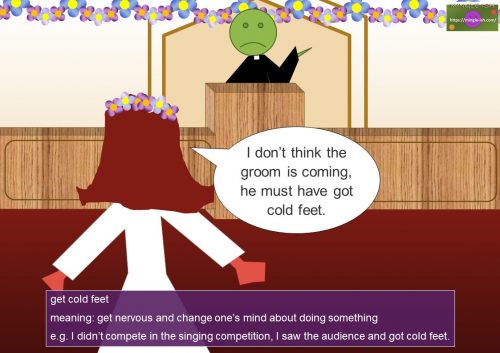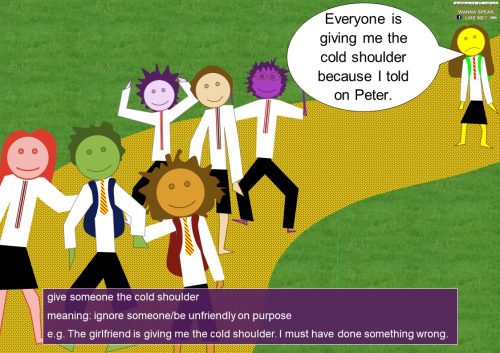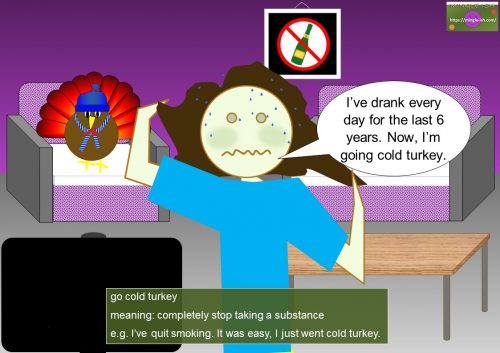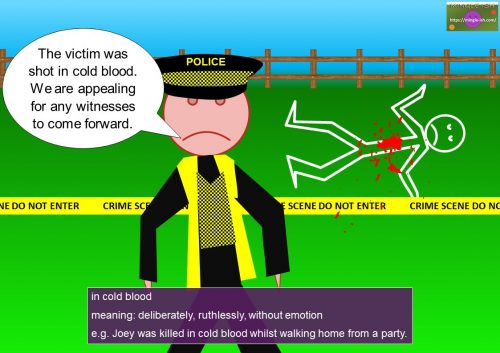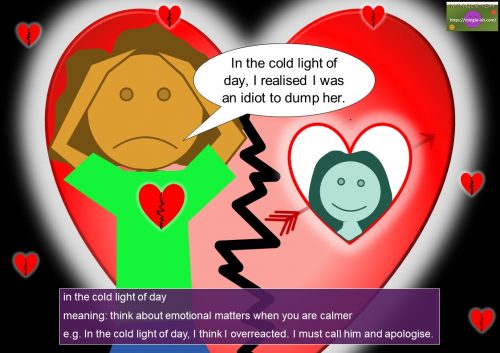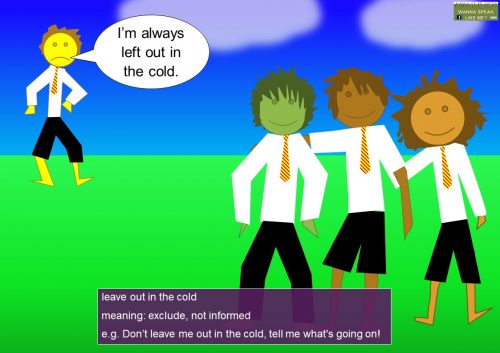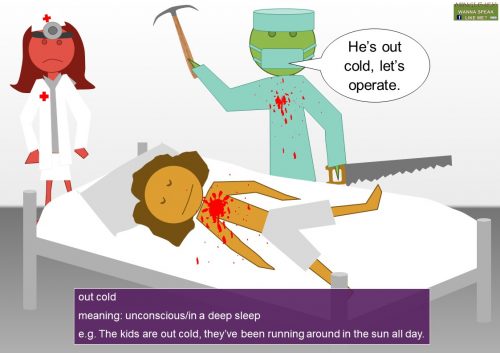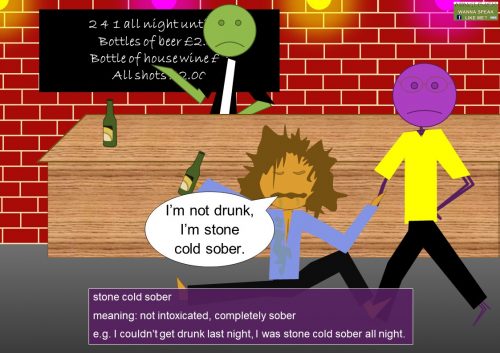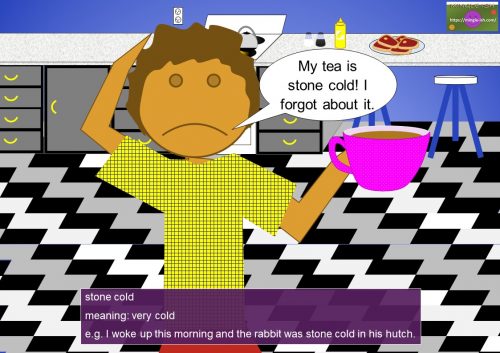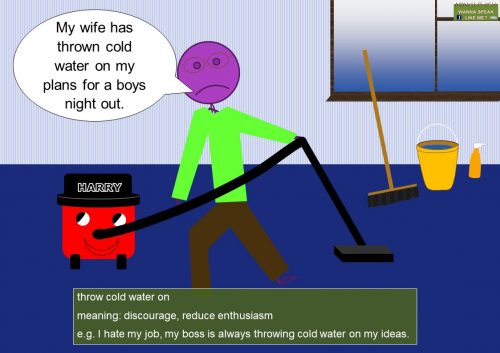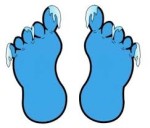Learning idioms can help you become more confident in English. Idioms can make your communication more natural, and, more interesting. This post will give you 24 common English Idioms with cold.
- A Cold Shower
- Cold As Ice
- Cold Call
- Cold Case
- Cold Comfort
- Cold Feet
- Cold Hard Cash
- Cold Shoulder
- Cold Storage
- Cold Sweat
- Cold War
- Cold-Blooded
- Cold-Hearted
- Coldcock
- Go Cold Turkey
- It’ll Be A Cold Day In Hell
- Make Your Blood Run Cold
- Out Cold
- Revenge Is A Dish Best Served Cold
- Stone Cold
I want to make this the best resource I could to help people just like you who want to use these Idioms. You will find a video for listening practice and review, PLUS a PDF Idiom list download that you can view anytime. The PDF contains the live links from the post and you can print it out for review anywhere, anytime.

Table of Contents
- Cold Adjective – Different Uses
- Idioms with COLD
- Weather Expressions with COLD
- Cold front
- Cold Wave/Cold Snap/Cold Spell
- Cold Idiom List PDF
Cold Adjective – Different Uses
The word cold is an adjective that is most commonly used to mean low temperature.
- My hands are cold.
- It’s going to be cold tomorrow.
cold_adjective – OxfordLearnersDictionaries.com
The adjective cold has a few other uses.
It’s used to describe food or drink that has not been heated OR is now cooled after being cooked at one point.
- There are some cold meats in the fridge if you want to make a sandwich.
- I love a cold drink on a hot day.
Cold can also be used with the noun truth to mean – facts with nothing added to make them more interesting or pleasant
- I can’t afford my current apartment any longer. It’s sad but that’s the cold hard truth. (Cold hard truth is a common expression used to describe an unpleasant fact.)
The adjective cold can also refer to someone being not friendly or unconscious. You will find these meanings represented clearly in the idioms listed below.
Word Origin
Old English cald, of Germanic origin; related to Dutch koud and German kalt, also to Latin gelu ‘frost’.
SOURCE
A Cold Shower
An expression used when someone needs to calm down when something has made them feel sexually excited SOURCE
- I thought about calling my ex-girlfriend for a quick rendezvous, but I realized that was a bad idea. Instead, I took a cold shower and went to bed.
Cold As Ice
1) Extremely cold.
- “I just finished shoveling the snow off my driveway and now my hands are as cold as ice.”
2) Distant and unfeeling. Showing no emotion
- “I think Janice is mad at me. I said hello this morning when I came to work but she was cold as ice. She didn’t even look at me.”
This is a popular song from 1977. The song is about a girl who has no feelings.

Music + lyrics – You can read as you listen.
Cold Call
Trying to get business from potential customers (sell them something) who have had no prior contact with the salesperson making the call.
- “Successful cold calling requires strong communication and persuasion skills.”
Cold case
An unsolved crime or investigation that is no longer being actively pursued.
- “The police department reopened the cold case after new evidence surfaced.”
Cold Case was the name of a popular TV series about – “The Philadelphia homicide squad’s lone female detective finds her calling when she’s assigned ‘cold cases,’ older crimes that have never been solved.” The show was on TV for 7 seasons. IMDb link
Cold comfort
Something that is not very comforting or helpful.
- “The apology was cold comfort for the damage they had done.”
Cold feet
To become nervous or uncertain about something, such as a decision or commitment.
- “He got cold feet before his wedding and almost left the city. Luckily his best friend convinced him that everything will be okay. He told him that it’s normal to get cold feet before getting married.”
Cold hard cash
Physical bills or coins that you can hold in your hands. Nothing digital.
- “The store won’t accept pay apps or even credit cards. Only cold hard cash.”
You can learn 110 Idioms and expressions with money at my blog post here >> https://worldenglishblog.com/idioms-about-money
Cold shoulder
To ignore or reject someone.
- “After their argument about her mother visiting for 3 weeks, Melanie has been giving Randy the cold shoulder. She won’t even look at him.”
Cold Storage
If something, usually food, is kept in cold storage, it is put in artificially cold conditions, usually to stop it from decaying. SOURCE
- Most large commercial fishing boats have cold storage on the ship to keep the fish fresh until they come back to land.
Cold Sweat
Perspiration (sweat) that feels chilly to the person who is sweating. This can be a sign of illness, shock, or the experiencing of an intense emotion such as despair, anxiety, or, especially, fear. https://en.wiktionary.org/wiki/cold_sweat
- Kelly woke up in the middle of the night in a cold sweat, feeling like she was being watched.
Cold war
A state of political tension and military rivalry between nations, typically without actual fighting.
- “The Cold War between the United States and the Soviet Union lasted from the end of World War II until the early 1990s.”
Cold-Blooded
Lacking emotion. This Idiom’s meaning is similar to Cold as Ice.
- The soldier was a cold-blooded killing machine who followed any order from his commanding officer.
*This is also used to describe creatures such as snakes, lizards, and fish that don’t warm their bodies internally.
Cold-Hearted
Refers to a person who is unfeeling, unemotional, or lacking in compassion or kindness.
- “Despite his tough exterior, deep down he was a warm-hearted person, not cold-hearted as everyone thought.”
Coldcock
This is a verb that means – To knock unconscious. SOURCE
- “Ian got coldcocked during a drunken bar fight.”
Go Cold Turkey
To give up (quit) a habit abruptly (suddenly) without stopping slowly, without reducing little by little.
- “Eric decided to become a vegetarian. He just stopped eating meat cold turkey.”
You can do a deep dive into this expression with podcast audio at my blog post here >> https://worldenglishblog.com/english-idiom-go-cold-turkey/
It’ll Be A Cold Day In Hell
This is used to indicate that something is extremely unlikely to happen. Often used to express anger or disappointment with something.
- “That restaurant was terrible. It’ll be a cold day in hell before I go back there.”
Make One’s Blood Run Cold
To cause fear or horror. When your blood runs cold you are often frozen in fear.
- Rob is terrified of heights, just the thought of skydiving makes his blood run cold.
Out Cold
This is used to describe a person who has lost consciousness or fallen asleep deeply.
- “The heavyweight contender was knocked out cold in the third round.” (Unconcious)
- “My son was so tired after playing all day that he was out cold soon as I put him to bed.” (Sleeping deeply)
Revenge Is A Dish Best Served Cold
This means that revenge is more satisfying when you get it after time has passed, rather than immediately. Especially after the object of your revenge has forgotten how they mistreated you and is taken by surprise.
- Malcolm knows that revenge may be sweet, but it’s a dish best served cold. He would take his time and plan his revenge perfectly.
Stone Cold
This is used to describe someone who is unemotional, calm, or unfazed by events. This idiom is also used to describe someone’s face or expression.
- “Thomas had a reputation for being stone cold, never showing any signs of emotion, even in the most stressful situations.”
- “His face was stone cold as a judge read the verdict.”
Weather Expressions with COLD
Cold front
This is a weather condition where colder air moves into an area where warmer air is present. https://en.wikipedia.org/wiki/Cold_front
- “A cold front is moving in this weekend, so wear warm clothes if you plan to spend time outside.”
Cold Wave/Cold Snap/Cold Spell
A rapid fall in temperature within a 24-hour period. This weather condition is announced as a warning for people, animals, and plants that will be exposed to the sudden drop in temperature. https://en.wikipedia.org/wiki/Cold_wave
The next 2 Cold Weather Idioms are a little bit rude. *Viewer discretion is advised.*
Cold Enough To Freeze The Balls Off A Brass Monkey / (As) Cold As A Witch’s Tit
Extremely cold.
- “The weather forecast said today will be -28°. That’s cold enough to freeze the balls off of a brass monkey.”
- “The weather forecast said today will be -28°. That’s as cold as a witch’s tit.”
The second idiom can be made more family-friendly like this.
- “Make sure to dress warm today, I heard that it will be as cold as a witch’s kiss.”
Cold Idiom List PDF
Download the Cold Idiom List as a printable PDF. Great for teachers to use with private or group classes. PDF contains the live links from the post.
Find many more helpful Idiom blog posts below.
What does cold mean?
The word ‘cold‘ as an adjective can mean a relatively low temperature or unfriendly. For example:
- It’s cold today, bring your coat. (low temperature)
- Jenny is very cold, I don’t think she should be a receptionist. (unfriendly)
cold idioms list
Let’s take a look at some common idioms containing the word ‘cold’.
- as cold as ice
meaning – unfriendly or very cold
example – Your hands are as cold as ice, put your gloves on. - blood runs cold
meaning – be terrified/frightened
example – The screams of the trapped workers made everyone’s blood run cold. - blow hot and cold
meaning – keep changing your attitudes towards something
example – Ryan keeps blowing hot and cold. One minute he loves me, the next he ignores me. - catch one’s death (of cold)
meaning – become ill with a serious cold
example – Tell Sammy to dry her hair before she goes out, she’ll catch her death of cold. - cold hard cash
meaning – physical cash in your hand
example – Someone offered me cold hard cash for my old table and chairs. - cold sweat
meaning – perspiration caused by anxiety/fear/shock/pain etc.
example – I woke up in a cold sweat, I had a nightmare about my exams. - get cold feet
meaning – get nervous and change one’s mind about doing something
example – I didn’t compete in the singing competition, I saw the audience and got cold feet. - give someone the cold shoulder
meaning – ignore someone/be unfriendly on purpose
example – The girlfriend is giving me the cold shoulder. I must have done something wrong.
- give someone the cold shoulder
meaning – ignore someone/be unfriendly on purpose
example – The girlfriend is giving me the cold shoulder. I must have done something wrong. - go cold turkey
meaning – completely stop taking a substance
example – I’ve quit smoking. It was easy, I just went cold turkey. - in cold blood
meaning – deliberately, ruthlessly, without emotion
example – Joey was killed in cold blood whilst walking home from a party. - in the cold light of day
meaning – think about emotional matters when you are calmer
example – In the cold light of day, I think I overreacted. I must call him and apologise. - leave out in the cold
meaning – exclude, not informed
example – Don’t leave me out in the cold, tell me what’s going on! - out cold
meaning – unconscious/in a deep sleep
example – The kids are out cold, they’ve been running around in the sun all day. - stone cold
meaning – very cold
example – I woke up this morning and the rabbit was stone cold in his hutch. - stone cold sober
meaning – not intoxicated, completely sober
example – I couldn’t get drunk last night, I was stone cold sober all night. - throw cold water on
meaning – discourage, reduce enthusiasm
example – I hate my job; my boss is always throwing cold water on my ideas.
cold idioms list with pictures
Here’s some real life picture examples.
You can download a table of ‘cold’ idioms and expressions below.
If you’ve enjoyed this page, don’t forget to check out some more idioms with adjectives by clicking on the links below.

В этот холодный осенний день вспомним несколько интересных идиом со словом cold, которые относятся отнюдь не к погоде и могут пригодиться в любой жизненной ситуации. Итак, отправляемся в путешествие по «холодным» идиомам.
Give someone the cold shoulder
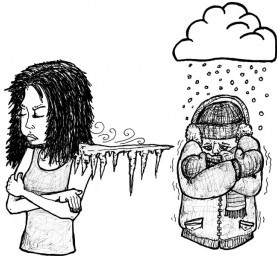
What have I done to him? He gave me the cold shoulder the whole evening at the party. — Что я ему сделал? Весь вечер на вечеринке он был холоден со мной.
Интересно происхождение этой идиомы. По одной из версий данное выражение не имело ничего общего с недружелюбным отношением. И вот почему . В средневековой Англии после пира хозяин дома обычно подавал своим гостям ломтик холодного мяса, отрезанного от говяжьей, свиной или бараньей лопатки (shoulder — плечо, лопатка), тем самым давая гостям понять, что пора собираться домой. Это расценивалось как вежливый жест и проявление такта. Но есть еще одна версия, причем совершенно противоположная. Согласно этому варианту, происхождение данной идиомы связывают с обычаем потчевать желанных гостей горячим угощением, а нежеланных — холодным куском бараньей лопатки, показывая таким образом свое «холодное» отношение.
Go cold turkey
Если вы хотите отказаться от чего-нибудь (чаще всего вредного), например, от алкоголя и сигарет или от шоколада и газировки, но при этом не будете постепенно отучать себя от своей вредной привычки, а порвете с ней резко, окончательно и бесповоротно, то это будет означать, что «You went cold turkey — Вы сразу и окончательно порвали с этим». Таким образом, выражение go cold turkey означает «резко и полностью порвать с чем-нибудь, чаще с какой-нибудь дурной привычкой; завязать».
A: You need to quit smoking. — Тебе нужно бросить курить.
B: I know, what do you recommend? — Я знаю, что ты посоветуешь?
A: I think you should just go cold turkey. Just stop. — Я думаю, тебе следует просто резко перестать курить (завязать с курением). Просто прекрати.
Одна из версий происхождения этого выражения связана с наркотической зависимостью. Когда пристрастившийся к тяжелым наркотикам резко перестает их употреблять, то во время абстинентного синдрома его кожа сильно бледнеет и становится похожей на гусиную (то есть на кожу ощипанной птицы). Есть также предположение о том, что эта фраза — своеобразное сравнение между поеданием холодной индейки (считается, что индейка, приготовленная накануне, не требует никаких приготовлений, ее можно есть сразу) и резким отказом от наркотиков, тоже без предварительной подготовки. Возможно, отсюда и значение, которое мы имеем сегодня go cold turkey — резко бросить, порвать с дурной привычкой.
Leave someone out in the cold / Come in from the cold
А вот идиома to leave someone out in the cold означает «сознательно не брать кого-либо в свою компанию, не позволять принимать участие в какой-либо деятельности, оставлять в стороне». В буквальном смысле это выражение имеет значение » оставить кого-либо на холоде, не позволить войти в теплый дом», отсюда и переносное значение — игнорировать, не давать разделить общую атмосферу дружеского тепла.
As soon as she went to the table where the group was sitting, they stopped talking. She was left out in the cold. — Как только она подошла к столу, где сидела группа, они прекратили беседу. Ее не приняли в свою компанию (Она была не принята в компанию, ее проигнорировали).
Если же, наоборот, кого-то снова принимают в компанию или группу, из которой он был исключен на какое-то время, то, чтобы передать это значение, используется идиома to come in from the cold (дословно — прийти с холода), означающая «быть снова принятым какой-нибудь группой или обществом».
He was finally asked to come in from the cold. — Его, наконец-то, попросили вернуться.
In the cold light of day
In the cold light of day (дословно — в холодном свете дня) означает » без эмоций, беспристрастно, иногда с чувством вины за совершенное». Обычно это выражение используется, если нужно подумать о чем-то спокойно, без лишних эмоций, например, утром, когда все кажется проще. Свет (light) в данном случае символизирует ясное понимание, а вот холод (cold) подчеркивает отсутствие эмоций.
You should think about it in the cold light of day. — Тебе следует подумать об этом спокойно, без эмоций.
The next morning, in the cold light of day, Sarah realized what a complete idiot she had been. — На следующее утро, подумав спокойно, Сара поняла, какой законченной идиоткой она была.
In cold blood
In cold blood — безжалостно, хладнокровно.
How insulting! To say something like that in cold blood is just horrible. — Как оскорбительно! Сказать безжалостно что-то подобное просто ужасно!
The whole family was murdered in cold blood. — Вся семья была хладнокровно убита.
Cold-blooded — бесчувственный, безжалостный, хладнокровный
Get cold feet или Have cold feet
Get cold feet (Have cold feet) — идиома, которая означает «струсить, испугаться, не решиться на что-то в последний момент (чаще на то, что вы уже запланировали или согласились сделать).
He got cold feet at the last moment and called off the wedding. — В последний момент он засомневался и отменил свадьбу.
I’m worried she may be getting cold feet about our trip to Africa. — Боюсь, что она может не решиться на нашу поездку в Африку.
На этом пока все. Надеюсь, вам понравился пост, и вы узнали для себя что-то новое. Попробуйте составить свои предложения с этими идиомами и поделиться ими в комментариях????
Hi everyone. Today we gonna have a look at some vocabulary issues.
- Get cold feet (decide not do something because you get nervous or scared): She wanted to marry him but then she got cold feet.
- Blow hot and cold (often change your opinion about something): I blow hot and cold about sushi. Sometimes I love it, sometimes I hate it.
- Leave someone cold (not impress someone): I’m afraid that movie really left me cold.
Let’s practice!
What are the missing words?
- Everyone seems to like that new exhibition at the art gallery, but it ____________________ me cold.
- I’m worried that James will get cold ____________________ and refuse to talk at the conference.
- It’s hard to tell what he thinks about this new project because he blows ____________________ and cold.
Hi there. My name is Anzhelica and I am an Engish teacher. I’m not a native, but I do believe that fro being an expert you don’t need to be one:) This blog is for veryone who is interested in Linguistics, English learning and English teaching. Enjoy:)
View more posts
We use a lot of cool cold idioms in English, but did you know that sometimes they have nothing to do with the temperature? That’s because idioms have a figurative meaning so we can’t take them literally.
Here you can learn the meaning of ‘catch a cold’, ‘chill out’, and other cold idioms, with examples to demonstrate exactly how to use them.
Catch a cold
Probably one of the best-known cold idioms is catch a cold. This refers to becoming ill with the common cold; a viral infection which is usually harmless but might give you a sore throat, a runny nose, a cough or a headache.
“Lesley has caught a cold so we will have a quiet weekend at home.”
“I always catch a cold around this time of year.”
You could also say that you are coming down with a cold if you feel like you are just starting to experience the symptoms.
We have more health and sickness idioms for you to discover in a separate article.
Give someone the cold shoulder
To give someone the cold shoulder means to deliberately treat them with indifference, coldness, or disregard.
“I thought Jake and I were getting on well but now he’s giving me the cold shoulder.”
Leave (someone) out in the cold
If you leave someone out in the cold, you ignore them or exclude them from a particular activity.
“I feel like I’ve been left out in the cold with this family camping trip.”
Cold snap
A cold snap is a period of unusually cold weather at a time when you would expect it to be warmer.
“This cold snap is going to kill off all my spring flowers.”
This one also appears on our list of winter idioms.
Out cold
Someone who is out cold is either unconscious or in a very deep sleep. You’ll have to use the context to determine which meaning applies!
“The kids were out cold as soon as we got home; they had a tiring day.”
“Davey was knocked out cold in the second round of the boxing match.”
We could also say out like a light to refer to someone who is fast asleep – view some more sleeping idioms here.
Cold light of day
When you look at something in the cold light of day, it means you consider it more rationally, unemotionally and calmly than when it first occurred.
“In the cold light of day, our argument over who would wash the dishes seemed rather petty.”
“Looking at these sales figures in the cold light of day, I can see the business is in serious trouble.”
Cold facts or truth
Similarly, cold facts are facts without any opinion or emotion added in. This can also be the cold truth, and you may often hear the phrase cold, hard facts used in the same way.
“If we look at the cold facts, it really doesn’t make sense to buy this house, no matter how charming it is.”
“The cold truth of the matter is that she doesn’t love me any more.”
Cold turkey
The idiom cold turkey refers to immediately and completely stopping something. It used to refer mainly to drug usage, but nowadays we can use it to talk about quitting any kind of habit.
“If you want to stop smoking, it’s best to quit cold turkey.”
“That game app was taking up way too much of my time. I’ve deleted it from my phone and now I’m going cold turkey.”
You can use cold turkey as an adverb phrase, or you may talk about going cold turkey.
Break out in a cold sweat
You break out in a cold sweat when you are anxious, nervous or frightened. It’s different to the type of sweat that comes from exercising or being too hot.
“He broke out into a cold sweat at the thought of doing a presentation in front of the class.”
Make your blood run cold
If something shocks, horrifies or frightens you, you could say it makes your blood run cold or makes your blood freeze.
“Reading this murder mystery book made my blood run cold.”
Another cold idiom you could use in this situation is send chills down your spine.
This is in contrast to making your blood boil, which is an anger idiom.
Cold-hearted
Someone who is cold-hearted seems to have no love, emotion or compassion. You may also say they have a cold heart or a heart of stone.
“My auntie always seems so cold-hearted towards me and my brother.”
You won’t be needing any of these love idioms to describe them!
Stone cold
Stone cold has a similar meaning to cold-hearted; it describes someone who lacks any emotion, feeling or concern. It can also just mean very cold.
“She was such a sweet young girl, I don’t understand how she became a stone cold killer.”
“Why are you home so late? Your dinner is stone cold.”
Cold comfort
A cold comfort is something that was supposed to be comforting but actually provided no comfort, reassurance or consolation at all.
“After Ishmael failed the test, it was cold comfort to know many of his friends had done the same.”
Did you know that this is an example of a Shakespearean idiom?
Get cold feet
If you get cold feet, you change your mind about something.
“Don’t tell me you’re getting cold feet two days before your wedding?”
Read more idioms using parts of the body.
Cold one
On a lighter note, cold one is an idiom mainly used in countries that use British English. It means a cold beer!
“I love to relax in the garden with a couple of cold ones on a Saturday afternoon.”
More cold-related idioms with ‘chill’ and ‘cool’
The following expressions don’t use the word ‘cold’ but they have a similar theme.
Chill out
To chill out means to become calmer or to calm down, and is often used as an imperative (command). It can also mean simply to relax.
“I know this is a difficult situation but everyone please chill out!”
“I’m going to spend the day chilling out on the beach.”
Note that chill out is fairly informal, so it’s best kept for situations with people you know quite well. Calm down is slightly less casual.
Take a chill pill
If someone needs to chill out, you could also tell them to take a chill pill. Again, this is an informal idiom.
“Why are you getting stressed over which shoes to wear? Just take a chill pill and let’s go!”
To accompany this, you might want to read up on some stress idioms too.
When hell freezes over
We say that something will happen when hell freezes over if we think it will never happen. It is usually said in a jovial way.
“You think I should run a marathon? When hell freezes over!”
A longer version of this cold idiom is when hell freezes over and the devil learns to ice skate.
Too cool for school
Somebody described as too cool for school may be well beyond school age, but they see themselves as very cool and fashionable and don’t want to involve themselves with anything that would seem dull or boring.
“Ever since Alan got that new acting job he thinks he’s too cool for school.”
Keep a cool head
To keep a cool head means to keep calm.
“I admire how Elena can keep a cool head in such a stressful situation.”
Keep (or lose) your cool
Similarly, to keep your cool means to remain calm. You can also lose your cool, meaning you fail to stay calm in a situation.
“Keep your cool and I’m sure you’ll pass your driving test.”
“I want to apologise to everyone on the team for losing my cool.”
Play it cool
To play it cool means to act calm even if you don’t feel it, or to avoid revealing much emotion or insecurity.
“When Ted said he wanted to end our relationship, I just played it cool.”
As cool as a cucumber
A fun one to finish off, although it’s a simile rather than a cool idiom. As cool as a cucumber is just an alliterative way to describe someone who is relaxed and composed, especially in stressful situations.
“Alanna was cool as a cucumber performing up on stage.”
So, that brings us to the end of this list of cold idioms. Did you discover some new expressions here? Or are there any other cool idioms you think should be on this list? Leave a comment to let us know! You might also want to check out these hot idioms and some more weather idioms to boost your English vocabulary.
Do you want to be more confident using English? Why not try Grammarly’s free proofreading tool. It checks as you write and helps you correct and improve your spelling and grammar.
Good cold Idioms include:
- Left out in the cold.
- I’ve got cold feet.
- He’s cold hearted.
- In cold blood.
- It will be a cold day in hell.
One common feature in many (but not all) of these idioms is that ‘cold’ signifies being unkind and unemotional. It’s often seen as a negative thing in contrast to warmth.
Other times, it’s positive – especially in regards to ‘cool’ or ‘chilled’, meaning relaxed.
Read below for all of the cold idioms I could come up with and explanations of each!
1. Left out in the Cold (Brought in from the Cold)
To be left out in the cold means that you have been excluded from something. You could imagine a dog standing outside in the cold weather looking in at their family sitting around a fire feeling warm. The dog feels excluded and unloved.
Figuratively, a person left out in the cold will be excluded from insider knowledge. They might be excluded because they’re not trusted enough or even not liked enough.
When someone does finally get included in secret information or even a secret club, they’re said to be “brought in from the cold”.
A person who is brought in from the cold might have been temporarily excluded due to a misdemeanor or because they annoyed people inside the “in group”.
Read Also: Cold Metaphors
2. Chilled Out
To be ‘chilled out’ means to be relaxed.
This term utilizes the symbolic meaning of cold as slow to anger,) slow to move, or calm. It’s in contrast to hot which generally means fast to anger and quick to react (for example: ‘he’s hot under the collar’).
There is also an element of being ‘cool’ here. You can imagine surfer dudes or the popular people in school having an air of being ‘chilled out’. They’re not easy to anger or upset and don’t seem to have much to worry about in their lives.
They appear perfectly happy and content with themselves.
3. Take a Chill Pill
This one builds on the above concept of being ‘chilled out’. If someone isn’t chilled out, we can tell them to “take a chill pill”.
We’re not saying they should literally take a pill. Rather, it is a suggestion that you stop and relax.
You would say this to someone who is angry as a colloquial way to let them know you think they need to calm down.
Or, you might say it to someone who is overly stressed about something that isn’t a really big deal. You’re telling them that they are stressed for no particular reason.
4. Cold Case
A cold case is an unsolved crime that is no longer being investigated. It is called a cold case because there are no longer any ‘hot leads’ (which are options left to explore to see if you can solve the case).
You could also say that ‘the lead has gone cold’ to talk about a situation where the police have no more clues to investigate.
The idiom also works because ‘cold’ is often associated with ‘dead’, so a ‘dead case’ is also a crime case that has not been solved.
5. Cold Feet
To get cold feet means to lose your nerve at the last minute. It’s usually attributed to runaway brides on their wedding day. A bride who does not turn up to her wedding is said to have “gotten cold feet”.
However, you can use it in other situations, also. For example, you could say that you got cold feet if you planned to go skydiving but backed out on the day.
This is an idiom whose origins are largely unknown and the analogy seems to make little clear sense to the layperson. Some early uses of the term include in Fritz Reuter’s 1862 novel Seed Time and Harvest and Stephen Crane’s novel Maggie: A Girl of the Streets.
6. Cold Hands, Warm Heart
Many people have a mild condition where their extremities (their feet and hands) get very cold. Often, you will hear people trying to comfort them by saying “cold hands, warm heart”.
The idea behind this is that you’re giving the person a somewhat unsolicited (and random) complement. “You might have cold hands, but you’ve got a lovely personality.”
For more about the idiom ‘warm heart’, see my article on heart metaphors.
Read Also: Winter Symbolism in Literature and Film
7. Cold Hearted
To be cold-hearted means to be aloof, unsympathetic and potentially evil.
If someone is being cruel to someone else, you might point them out and say “that person is cold-hearted”.
This idiom stems from the common idea that to be ‘warm’ is to be kind and welcoming (like a warm hearth – you want to sit by it!) and to be cold is the opposite – it’s negative (you don’t want to be out in the cold too long!).
8. Cold Light of Day
The idiom ‘cold light of day’ means to look at something in a clear and emotionless way.
It stems from the idea that you might do something when your emotions are high. But if you wait another day and re-visit the thing that got you emotional, you might see it from a different perspective.
The term ‘cold’ here refers to your emotions. They are no longer ‘hot’ (i.e. angry) but rather ‘cold’ (emotionless). This is a similar usage as ‘to do something in cold blood’ discussed later in this article.
9. Cold Shoulder
To give someone the cold shoulder means to shun them.
You could imagine a person walking into a dinner party and greeting everyone else at the party but not you. They intentionally left you out because they’re annoyed at you.
Here, they ‘gave you the cold shoulder’.
The first half of the idiom – cold – is used in the sense of emotionlessness and unkind. The second half – shoulder – may refer to the fact they’ve got their back to you. To see you, they would have to look over their shoulder (probably with a snide look on their face, too!)
10. Cold Turkey
The term ‘cold turkey’ means to give something up immediately rather than slowly doing it less and less over time.
It’s most often used when referring to quitting smoking.
The term comes from the idea that people who get withdrawal symptoms often get clammy skin and goosebumps. In these cases, their skin looks like the skin of a turkey in their freezer: bumpy and clammy!
11. Cold War
The cold war was a diplomatic dispute between the United States and the USSR that spanned most of the second half of the 20th Century. Each superpower was pushing their own ideology – communism vs. capitalism – around the world. They also both had nuclear weapons, which led to significant concerns about a nuclear war.
It’s called the “cold” war because there wasn’t actually any direct battles taking place (besides some proxy wars). Rather, it was a stand-off that everyone knew could lead to a war without delicate diplomatic handling.
Today, you might use this idiom in a metaphorical sense to refer to two family members or work colleagues who strongly loathe one another and aren’t on speaking terms, but nonetheless are not arguing outright.
12. Stone Cold
‘Stone cold’ means ‘completely’. It comes from the idea that stones can be very cold and devoid of any heat.
A common usage of this term is to say that your tea or coffee is ‘stone cold’, meaning you have let it sit for so long that there’s no heat left in the drink at all.
Another time it is regularly used is to refer to a good looking man as a stone cold fox. You could interpret this as an ‘absolute’ fox, where ‘fox’ is a term to explain a good-looking person.
Read Also: Stone Metaphors
13. Cool Reception
To give someone a cool reception means to make them feel unwelcome or unliked.
You could imagine walking into a room and many people in that room not particularly liking you. So, instead of jumping up and giving you a kiss on the cheek, they sit there and ignore your appearance.
Again, this uses the term ‘cool’ in the sense of unkind and unwelcoming.
14. Froze Up
To ‘freeze up’ means to have a mental block where you cannot do or say things easily.
For example, if you were on a live television interview, and someone asks you a question, but you couldn’t think of an answer, you ‘froze up’. This often happens when we get stage fright.
Imagine your thoughts are like a flowing river. Usually it flows with ease and your thoughts flow in and out of your mind. When that river ‘freezes up’, your thoughts can no longer flow, and you’re stuck without any idea of what to think or say!
15. He’s Frosty
When you call someone frosty, you’re saying that they’re not very kind or welcoming. They might even be outright cruel. Once again, we’re seeing ‘cool’ being associated with ‘unkind’.
For example, if you meet your new boss and he doesn’t smile at you and take time to get to know you, you might think “oh no, my boss is frosty!”
You can also say ‘frosty reception’ as a substitute for ‘cool reception’.
16. Hot and Cold
Someone who is ‘hot and cold’ is a person whose attitude changes regularly. It’s often in regard to attitude toward something, like a person (you?) or a thing or idea.
For example, one minute they seem to be happy to see you and then the next they seem to be ‘cold’ toward you (meaning they aren’t behaving like they like you).
Or, it might be ‘hot and cold’ about the idea of buying a new car. One day they really want it and the next they decide they don’t want it. Their thoughts about the car might alternate daily.
17. In Cold Blood
To do something in cold blood means to do it in a calm manner. It’s in contrast to ‘in hot blood’, which would mean to do it during a moment of intense emotion.
This idiom is usually used in relation to murder.
A person who murders someone in cold blood has planned it out and done it methodically. By contrast, a killing ‘in hot blood’ might have occurred during a moment of intense anger, and they quickly came to regret their actions.
18. It’ll be a Cold Day in Hell
When you say “it will be a cold day in hell”, you are saying that something is very much unlikely to happen. In our culture, we think of hell as a very hot place, like a furnace.
So, to say “it’ll be a cold day in hell before I (do something)”, you’re saying “that will never happen”, just like hell will never be cold.
An alternate saying that means the same thing is: “when hell freezes over”.
19. Knocked out Cold (or just Out Cold)
If you are “out cold”, you’re unconscious.
We will often say someone is “knocked out cold” in relation to a boxing fight. It means that they have been punched so hard that they lost consciousness.
You could also simply say “out cold” in relation to someone who is fast asleep. For example, you might say “Don’t bother trying to wake John up. He’s out cold.” In this case, John is unlikely to wake up because he is in a deep sleep.
Read Also: Sleep Metaphors
20. Let it Thaw
Thawing is the process of letting something that is frozen slowly de-freeze.
We can use the idiom ‘let it thaw’ to refer to any situation where you are going to let some time pass because you think time can solve a problem.
For example, if you were having an argument with your husband or wife, you might “let it thaw”, meaning you will forget about it for a few days. By the time you come back to the argument, both of you might be looking at the issue from a calmer and less emotional perspective.
21. Pour Cold Water on It
We will usually say to “pour cold water” on something to refer to the idea of rejecting or stopping something.
It comes from the idea that you can put cold water on a fire to put it out.
Usually, we will use this idiom when we are talking about how someone’s idea was rejected. For example, you might have an idea to start a new business selling cupcakes. You might go to your parents and ask them what they think and they say “it’s a terrible idea, don’t do it.”
Here, you could say that your parents “poured cold water” over your idea.
Read Also: Water Metaphors
22. Pried from my Cold Dead Hands
If you say “it will be pried from my cold dead hands”, you’re saying that you’re not going to give something up. You will have to be killed before you hand it over.
The reason we have “cold” here is because dead bodies have lost all their usual body heat. We usually have warmth emanating from out bodies, but once we die, that disappears.
You might use this phrase if you have a candy that you are not going to give up to someone who wants it.
Read Also: Death Metaphors
23. Put it on Ice
To put something on ice means to put it on hold for a while. For example, you might have a great big idea to start a business selling lemonade. You think it’s a great idea, but you’re too busy right now. Maybe you can do it in January when you’re less busy.
You’ll say: “Let’s put that idea on ice and come back to it in January when we have time for it.”
The idea here is that putting things on (or in) ice preserves it in its current state. For example, you could put a steak on ice to prevent it from going off until you’re ready to cook it.
Read Also: Ice Symbolism
24. Revenge is a Dish Best Served Cold
Earlier, I referred to ‘killing in cold blood’. This idiom is related to that one.
If you kill in cold blood, you do it in a calm, methodical manner. You don’t do it out of emotions.
Similarly, in this idiom, we’re talking about taking revenge in cold blood. It’s saying that you shouldn’t take revenge while you’re highly emotional and angry. Instead, wait until you have calmed down and then take revenge in a subtle, stealthy way that will be more effective.
You could use this phrase if your friends is really angry and wants to take revenge on someone. Say: “Calm down and wait until tomorrow. Revenge is a dish best served cold.”
Read Also: Anger Metaphors
25. Pay Freeze
No, this doesn’t mean you put all your money in the freezer. It means you’re not getting a pay rise this year.
You will often hear this term discussed in relation to the public service. The government might need to save money so they say “we will put in a pay freeze on all public employees this year”.
What they really mean is a pay pause. So, ‘freeze’ is used as a replacement for ‘pause’ here, because if something’s frozen, it won’t move.
26. Stuck in Colder Weather
You say you’re “stuck in colder weather” to someone when you wish you could be with them but you won’t be able to be there.
This idiom is saying that you would rather be somewhere else right now (for example, having a dinner party with your family). But you can’t be there – you’re “stuck in colder weather”. The implication is that colder weather is a bad thing, and you’d rather be in warmer weather with your friends.
There is a song based on this idiom by Zac Brown Band.
27. Freeze!
The command “Freeze!” is often used by police to order people not to move.
Everyone has seen police shows where a police officer yells out “Freeze!” and holds his gun up to a thief.
You could even hear a teacher say it when their students are running around causing a riot in the classroom. They might say “everyone freeze and put your hands on your head”.
Like the terms ‘pay freeze’ and ‘to freeze up’, again we’re seeing that freeze is often used as a metonymy for pause, and when placed in a sentence where analogy is constructed, becomes a metaphor.
Conclusion
Idioms are great tools for learning about the English language. Something central to a lesson on cold idioms is the idea that coldness is usually a negative thing, while coolness is good because it means ‘relaxed’.
I’m Chris and I run this website – a resource about symbolism, metaphors, idioms, and a whole lot more! Thanks for dropping by.
On a throne hung with clouds sat the Frost-King; a crown of crystals bound his white locks, and a dark mantle wrought with delicate frost-work was folded over his cold breast.
Then Violet hung the wreath above the throne, and with weary foot went forth again, out into the cold, dark gardens, and still the golden shadows followed her, and wherever they fell, flowers bloomed and green leaves rustled.
It was too cold for Mary Ann to venture, so she stayed with her mamma, to the great relief of her brother, who liked to have me all to himself.
Bloomfield invited me to partake of a frugal supper of cold meat and bread.
She was led before his grace, and the doctor putting a finger carelessly on the ducal heart, which for convenience sake was reached by a little trapdoor in his diamond shirt, had begun to say mechanically, «Cold, qui—,» when he stopped abruptly.
They also cleared the snow off her, but soon she was covered again, and they saw she was in danger of perishing of cold.
Almost immediately, however, Peony pulled away his little fist, and began to rub it as if the fingers were tingling with cold; while Violet also released herself, though with less abruptness, gravely remarking that it was better not to take hold of hands.
They were both of them jovial about the cold in winter and the heat in summer, always ready to work overtime and to meet emergencies.
They found him there the next morning, very wet, very cold, but no longer hungry.
Woodhouse had so completely made up his mind to the visit, that in spite of the increasing coldness, he seemed to have no idea of shrinking from it, and set forward at last most punctually with his eldest daughter in his own carriage, with less apparent consciousness of the weather than either of the others; too full of the wonder of his own going, and the pleasure it was to afford at Randalls to see that it was cold, and too well wrapt up to feel it.
«21st May.—Started 11 a.m., finding the atmosphere quite cold enough to travel by day, and carrying some water-melons with us.
But Aunt Myra spoke, and he could not resist the temptation to make light of her advice, and let Rose brave the cold. He had no fear of its harming her, for she went out every day, and it was a great satisfaction to him to see her run down the avenue a minute afterward, with her skates on her arm, looking like a rosy-faced Esquimaux in her seal-skin suit, as she smiled at Aunt Myra stalking along as solemnly as a crow.
Cold and keen the north wind blows, Silent falls the shroud of snows.
When the night came the air at Lyvern was like iron in the intense cold. The trees and the wind seemed ice-bound, as the water was, and silence, stillness, and starlight, frozen hard, brooded over the country.
Thus musing, I had walked my way out of the throng, and only a figure here and there in the shadows of doorways waited and waited in the cold.
Linguazza.com — English language
discovery tool BETA
Search phrases with a word or a set of words, find usages in context, see
related terms and expressions, topic
distribution and much more.
Disclaimer
Linguazza.com website aggregates word and phrase usages for educational and informational purposes
only in accordance with fair use principle. All above text quotes are in ownership of their legal
owners. Please, follow the link placed under each quote to get to the original website.
Privacy Policy
Terms & Conditions











